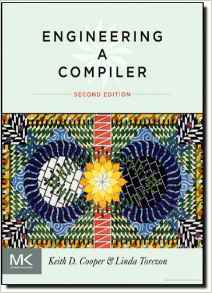Engineering a Compiler: A Deep Dive
Introduction
"Engineering a Compiler" by Keith D. Cooper and Linda Torczon is a seminal work in the field of compiler design. This comprehensive textbook provides a modern and in-depth exploration of the principles and techniques involved in building compilers for today's complex computer architectures.
Key Concepts Covered
- Front-End:
- Lexical Analysis: The process of breaking down source code into a stream of tokens (e.g., keywords, identifiers, operators).
- Syntax Analysis (Parsing): The process of analyzing the grammatical structure of the source code to determine its meaning.
- Semantic Analysis: The process of checking the semantic correctness of the program, such as type checking, scope resolution, and data flow analysis.
- Intermediate Representation (IR): The representation of the source code in an intermediate form that is easier to manipulate and optimize.
- Middle-End (Optimization):
- Data Flow Analysis: Techniques for gathering information about the flow of data within a program, such as reaching definitions, live variable analysis, and constant propagation.
- Instruction Selection: Choosing the appropriate machine instructions to implement high-level language constructs.
- Register Allocation: Assigning variables to CPU registers to minimize memory access.
- Loop Optimization: Techniques such as loop unrolling, loop invariant code motion, and strength reduction to improve loop performance.
- Instruction Scheduling: Reordering instructions to improve instruction-level parallelism and pipeline utilization.
- Back-End:
- Code Generation: The process of translating the optimized intermediate representation into machine code for the target architecture.
- Target-Specific Optimizations: Optimizations tailored to the specific characteristics of the target architecture, such as instruction set and memory hierarchy.
- Code Emission: The process of generating the final machine code output.
Key Features of the Book
- Modern Approach: The book emphasizes modern compiler techniques, including advanced optimization algorithms, parallelization techniques, and support for modern architectures.
- Practical Focus: The book provides practical insights into the challenges and trade-offs involved in compiler design and implementation.
- Real-World Examples: Numerous examples and case studies are used to illustrate key concepts and demonstrate their practical application.
- Focus on Clarity and Understanding: The book is written in a clear and concise manner, making it accessible to students and researchers with varying levels of background in computer science.
Applications and Impact
- Compiler Development: The concepts and techniques presented in the book are essential for the development of high-performance compilers for various programming languages.
- Systems Software: Compiler technology plays a crucial role in the development of operating systems, device drivers, and other systems software.
- High-Performance Computing: Optimizing compilers are essential for achieving high performance on modern computer architectures, including multi-core processors and GPUs.
- Research and Development: The book serves as a valuable resource for researchers in the fields of compiler design, programming languages, and computer architecture.
References
- "Engineering a Compiler" by Keith D. Cooper and Linda Torczon (3rd Edition)
- "Compilers: Principles, Techniques, and Tools" by Alfred V. Aho, Monica S. Lam, Ravi Sethi, and Jeffrey D. Ullman ("The Dragon Book")
- LLVM Project: https://gcc.gnu.org/
Disclaimer: This white paper provides a general overview of the key concepts covered in "Engineering a Compiler." The specific content and depth of coverage may vary between editions.
Conclusion
"Engineering a Compiler" is a valuable resource for anyone interested in understanding the intricacies of compiler design and implementation. By delving into the core principles and techniques, readers gain a deeper appreciation for the complexities of translating high-level source code into efficient machine code and the profound impact of compilers on modern computing.



